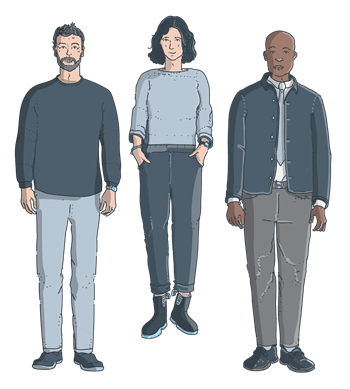How is gene therapy studied?
Clinical trials
Like with any drug, gene therapy starts as an idea or discovery in a lab. And before it can be prescribed or administered, it must be proven safe and effective through clinical trialsClinical trialsa study that measures the safety and effectiveness of a medication in humans
See glossary for more terms >. These trials are highly regulated by the US Food and Drug Administration (FDA)US Food and Drug Administration (FDA)an agency in the US federal government whose mission is to protect public health by making sure that drugs, medical devices, and other equipment are safe and effective
See glossary for more terms > and controlled by the companies or research institutes that are developing gene therapies.1
Any person participating in these trials must be informed verbally and in writing about the potential risks and benefits of participating in the trial. This is called informed consent. These documents can be long, and contain a lot of information, but it is critical to review them carefully with your family and physician to understand all the potential risks of participating in the clinical trial.2,3
Before a gene therapy is tested in clinical trials, researchers must study it first in a laboratory. These studies are called preclinical studiesPreclinical Studya study that aims to demonstrate proof of concept, support efficacy, and/or measure safety of a treatment or therapy before it is allowed to be tested in people
See glossary for more terms >, and help researchers decide what gene therapies are ready to put into clinical trials. When a gene therapy is ready for a clinical trial in people living with a specific disease, the manufacturer submits an application to the FDA to gain approval to start this type of clinical trial.4 There are usually 3 phases to each clinical trial, each involving a slightly greater number of people.5,6

Clinical trial phases6
Phase 1
Phase 2
- Phases 1 and 2 are often combined in gene therapy studies to accelerate the time of drug development or help decrease costs. They may also be combined due to the smaller numbers of patients living with the disease being studied.
Phase 3
How long does it take to get a gene therapy approved?
How are gene therapy clinical trials unique?
Though the specifics will be different for each gene therapy moving into clinical trials, some of the key differences between trials of gene therapies and trials of traditional pharmaceutical products are:
- The nature of the risks of gene therapy products can be different from those typically associated with traditional pharmaceuticals6
- A gene therapy alters the cells of a person to target a genetic change. The targeted genetic change is expected, but it is difficult to know how this change will affect the body long-term without more data
- Early-phase clinical trials of gene therapy products often involve preclinical challenges, chemistry, manufacturing, and control (CMC) processes, and clinical safety questions that are less common in the development of traditional pharmaceuticals6
- Questions about durability of response for gene therapy products often can’t be fully answered in clinical trials of reasonable size and duration; approved gene therapies use long-term follow-up studies and registries to capture and collect additional years of safety and efficacyEfficacythe ability of a medication to achieve its desired effect
See glossary for more terms > data7 - There are smaller trial populations because only people with the disease (or change/mutation) are enrolling. Recent studies have focused on genetic diseases and certain types of cancer4,6,8

Explore Genehome
Explore Genehome
Other topics you may be interested in:

Keep learning with Genehome
References
1. Food and Drug Administration. Human gene therapy for rare diseases: guidance for industry. January 2020. Accessed July 1, 2021. https://www.fda.gov/media/113807/download 2. Food and Drug Administration. Informed consent for clinical trials. Accessed July 1, 2021. https://www.fda.gov/patients/clinical-trials-what-patients-need-know/informed-consent-clinical-trials 3. National Institutes of Health. ClinicalTrials.gov. Learn about clinical trials. Accessed July 1, 2021. https://www.clinicaltrials.gov/ct2/about-studies/learn 4. Food and Drug Administration. Guidance for industry: preclinical assessment of investigational cellular and gene therapy products. Accessed July 1, 2021. https://www.fda.gov/media/87564/download 5. Food and Drug Administration. Step 3: clinical research. Accessed July 1, 2021. https://www.fda.gov/patients/drug-development-process/step-3-clinical-research 6. Food and Drug Administration. Considerations for the design of early-phase clinical trials of cellular and gene therapy products: guidance for industry. Accessed July 1, 2021. https://www.fda.gov/media/106369/download 7. Food and Drug Administration. FDA continues strong support of innovation in development of gene therapy products. Press release. Accessed July 1, 2021. https://www.fda.gov/news-events/press-announcements/fda-continues-strong-support-innovation-development-gene-therapy-products 8. American Society of Gene and Cell Therapy. Trials finder. Accessed July 1, 2021. https://app.emergingmed.com/asgct/home
